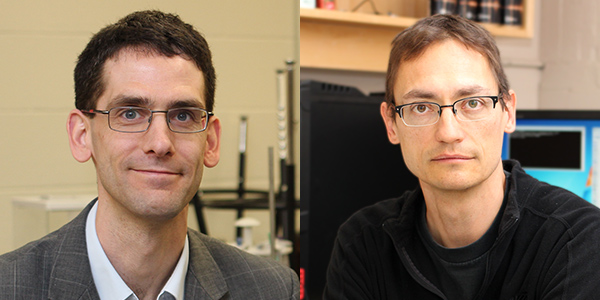News & Events
Burgess and Gutwin first winners of Division of Science researcher awards
 |
| Ian Burgess (left) and Carl Gutwin |
Ian Burgess (Chemistry) and Carl Gutwin (Computer Science) are the recipients of the Division of Science's inaugural researcher awards.
The Distinguished Researcher Award and the New Researcher Award recognize faculty members who have made outstanding contributions to their disciplines. The New Researcher Award is presented to a faculty member in the Division of Science who received his or her Ph.D. less than 10 years ago.
2014 Distinguished Researcher Award – Carl Gutwin, Department of Computer Science
Gutwin is one of the world’s foremost experts on the fundamental role of awareness in the design of distributed groupware: software that enables people to work together over computer networks. His work has greatly increased our understanding of how to support rich and productive group work at a distance. Gutwin’s more than 160 publications have been cited more than 4,400 times.
Fueled by the recent transformation of computers from their roles as business machines and game consoles to lifestyle commodities, computer-human interaction (CHI) is currently one of the strongest and most competitive areas of computer science. Gutwin is recognized internationally for his contributions to CHI. He was recently inducted into the CHI Academy, a distinction held by only three other Canadian faculty members and only 80 members worldwide. This distinction puts Gutwin in the company of the true pioneers of computing.
2014 New Researcher Award - Ian Burgess, Department of Chemistry
Ian Burgess's research group is investigating a wide range of fundamental and applied electrochemistry problems. Burgess has attacked difficult research challenges, notably the development of surface-enhanced infrared absorption spectroscopy (SEIRAS) and the use of high-brilliance IR photons produced at the Canadian Light Source (CLS) to study electrified interfaces. His nearly 50 publications are well-recognized for their originality in new areas of electrochemical research. Other avenues of productive research directions include investigations on the absorption of stabilizing molecules and ionic liquids onto the surface of gold nanoparticles and gold single-crystalline surfaces, electrochemically driven chemical reactions on surfaces modified with self-assembled monolayers, the specular reflection of neutrons to study thin films at electrode surfaces, and corrosion studies of interest to commercial sectors.